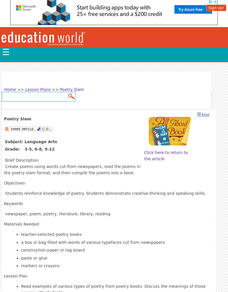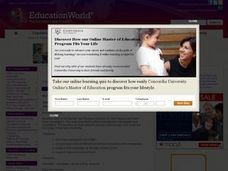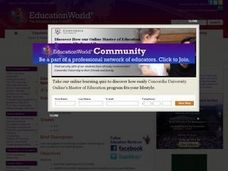Curated OER
Find The Hidden Message: Media Literacy in Primary Grades
Learners practice listening to and reading various types of media and text. In groups, learners use video, newspapers, magazines, and more to compare and contrast different types of information. They identify the differences between fact...
Curated OER
Using Print Media in the LCTL Classroom
Explore newspapers as a form of print media. They examine headlines from newspapers and infer meanings of the headlines. They skim articles for information and exchange articles between groups. They complete charts while skimming the...
Curated OER
Cruise the News
Learners utilize newspapers as a resource to complete various tasks. They read articles, write summaries, investigate the classified section, write commercials, and circle spelling words.
Curated OER
News
How does broadcast news differ from accounts reported in newspapers? On the radio? Through the Internet? Middle schoolers discuss the news and speak about the differences between news in print and broadcast news. Given a list of six...
Curated OER
Poetry Slam!
Create poems without writing! Young poets create poems using words cut from newspapers, read their poems aloud, and compile them in a book. This lesson allows the teacher to view each learner's creative process and assess their current...
Curated OER
Johannes Gutenberg and the Printing Press
Students use library or online resources to create time lines on the life of Johannes Gutenberg and tell the impact his invention, the printing press, had on the development of newspapers.
Curated OER
A Better Class of Journal-ists
Young academics create a current events journal by skimming newspapers for articles that fit defined guidelines for informational texts. After cutting out two articles each week to add to their journals, they write a brief description of...
Energy for Keeps
The Energy Times
Extra! Extra! Read all about past and present energy use in a classroom-made historical newspaper. Useful as a cross-curricular assignment between science, history, and language arts, the project is sure to get young journalists...
Curated OER
Fact vs. Opinion (Part II)
How can you tell the difference between fact and opinion? Using newspapers, learners determine which articles contain statements of fact, and which articles reflect the writer's opinion. The lesson plan includes a discussion format and a...
EngageNY
Analyzing the Features of a Newspaper Article
There's more to newspaper articles than meets the eye. Scholars learn the different features of a newspaper article, including headline, byline, subheadings, etc. Pupils circle the features in an article as the teacher discusses their...
Dream of a Nation
Read, Watch, Write for Pathos, Logos and Ethos
Encourage your young citizens to make a difference. Using Tyson Miller's Dream of a Nation: Inspiring Ideas for a Better America as a starting point, class members watch documentaries, investigate issues, and then write letters to...
Curated OER
Newspaper Crafts
Here are a couple of unique ways to utilize old newspapers in school in the form of an arts and crafts project. The first is a smile umbrella made out of newspaper, the second requires learners to look through newspapers or magazines to...
Curated OER
Fact and Opinion Project
Explore fact and opinion in the newspaper with your high schoolers. they will read the newspaper and write down specific information they identify as fact and information that is an opinion. Students draw an art project to...
Curated OER
Writing Newsletters!
A reading of Gail Gibbons’ Deadline! leads to a discussion of the differences between newspapers and newsletters. Class members then choose a favorite topic and create the front page for their own newsletter.
Curated OER
Information Overload: Looking at News
How do events reported in mainstream newspapers, on television news, blog posts, and social network sites differ? Ask your class to investigate the way the same news item is presented in the many information sources available. Groups...
Curated OER
Cooperative Group Spelling Game
Partners or groups work together to practice the correct spelling of words. They speed-cut letters from print sources and arrange them into correctly spelled words from their lists. Newspapers are suggested, but magazines might result in...
Curated OER
Rivers and Streams Research Activity
In this geography research worksheet, student examine books, newspapers, or the internet to find information about the history of flooding in the United Kingdom. They write a fictional account in a news report, TV interview, or a blog....
PBS
What Is Newsworthy?
What is news? What is newsworthy? Who decides and what criteria do they use? Introduce young journalists to the basics of reporting with this media literacy lesson.
Curated OER
Crayon Etching- Medieval Bestiary
Sixth graders make connections between art and literature studying about Medieval imagery and beliefs.
Ellsworth American
Think About the Newspaper
Investigate the significance of adjectives with a newspaper activity that addresses effective language. Readers probe teacher-provided articles in search of the mighty modifiers, and practice by replacing them with a different word, and...
ESL Kid Stuff
Actions - Present Continuous
What are you doing? Why, studying the present continuous tense, of course. Language learners engage in activities and exercises that provide them with practice crafting and answering questions using the present continuous tense.
ESL Kid Stuff
Past Tense Activities - Irregular Verbs: Part 2
The second part of a two-part instructional activity on irregular past tense verbs prompts language learners to add four more verbs to the list of twelve they have been working with.
Curated OER
The Times and Life During the California Gold Rush
Fourth graders read about the era in their history books, write in their journals revolving around the Gold Rush, making crafts such as newspapers, and also play the part of the Forty-niners.
Curated OER
Writing Summaries
Practice summary writing with informational texts. Young readers create summaries after reading magazine articles, newspaper articles, or other forms of informational texts. Readers use the GRASP strategy (read text, write what you...

























